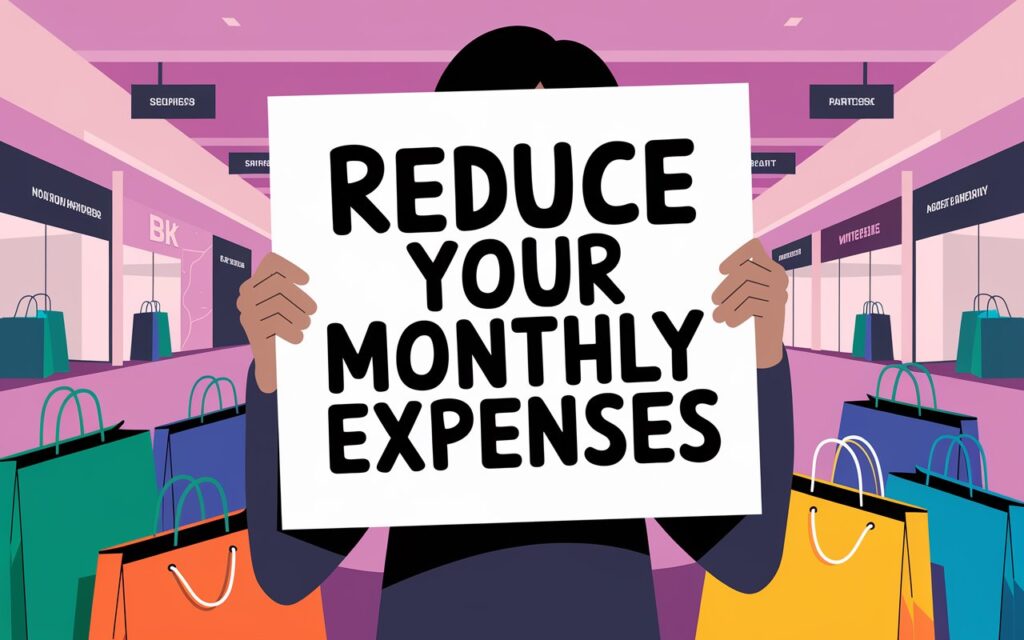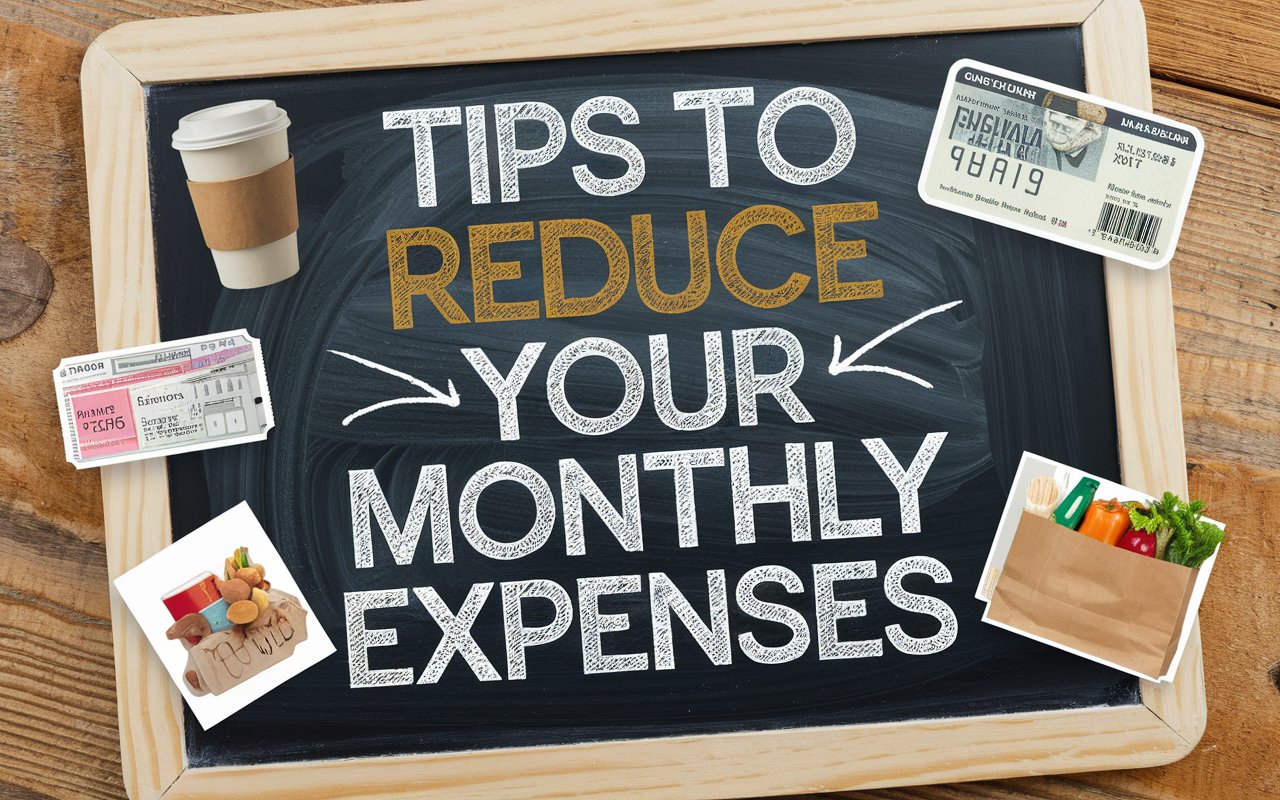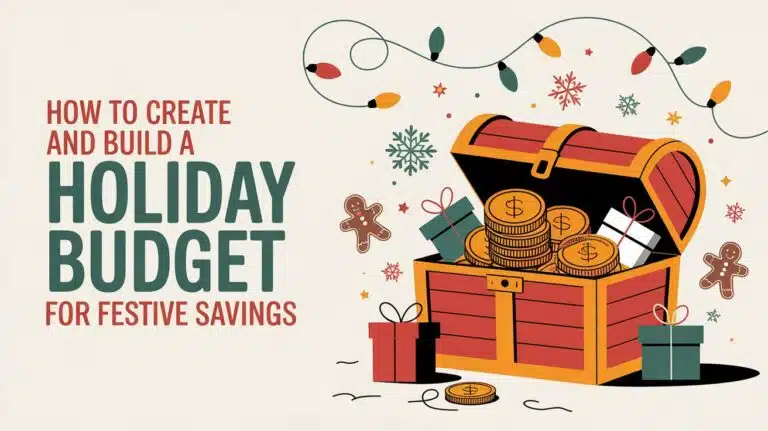We all want to save money, but it can be hard to figure out where to start. I’ve been in the same situation myself, and it took me some time to find a way to cut down on my monthly spending without making too many sacrifices.
The truth is, we often overlook small ways to save that can make a big difference over time. In this blog post, I’ll share tips that helped me reduce my monthly expenses. Whether you’re looking to save a little or a lot, these tips can help.
How to cut your monthly expenses?
Cutting down on your monthly expenses is all about being intentional. You need to be aware of where your money is going and then find ways to spend less.
But where do you start? I’ve learned it’s easier to tackle one area at a time. To help you out, I’ll go over specific areas where you can make changes. Read the following tips to get started.
Budget wisely
Creating a budget is the first step. Without a budget, you might not even know how much you’re spending each month. I recommend starting with a simple budget that lists your income and all your monthly expenses.
The goal is to make sure your expenses don’t exceed your income. This doesn’t have to be complicated; even a basic list of categories and numbers will work.
Once you see everything laid out, it becomes easier to spot areas where you can cut back.
I’ve found it helpful to review my budget regularly. Life changes, and so do expenses. Revisit your budget every few months to make sure it’s still working for you.
Over time, you’ll get better at knowing what to expect in your spending, and your budget will become a useful tool.
Track your expenses
Along with budgeting, tracking your expenses is key. You might be surprised at where your money is going each month. Little things, like a coffee here or a snack there, can add up quickly.
To track your expenses, you can use a notebook, an app, or even a spreadsheet. The point is to be aware of every dollar you spend.
I’ve tried different methods for tracking my spending, and I found that writing everything down works best for me. It makes me more mindful of where my money goes, and it also helps me see patterns.
For example, I noticed I was spending too much on dining out, which led me to cook more at home. Tracking your spending can give you the insights you need to make better financial decisions.
Consolidate debt
If you have multiple loans or credit card balances, consolidating your debt can help reduce the overall amount you pay each month. Debt consolidation combines all of your debts into one payment, which often comes with a lower interest rate.
This not only makes your payments more manageable but can also save you money in the long run.
When I had credit card debt, consolidating it into a single loan helped me reduce my monthly payments. I no longer had to keep track of multiple due dates, and I felt a sense of relief.
It’s important to make sure you’re getting a good deal, though, as some options may come with higher fees or terms.
Eat at Home
One of the easiest ways to cut expenses is by eating at home more often. Eating out or ordering takeout is expensive.
I used to spend a lot on takeout because I felt too busy to cook. But once I started preparing meals at home, I noticed a big difference in my budget.
Cooking at home doesn’t have to be difficult or time-consuming. You can start with simple meals and work your way up. It’s not only cheaper, but it’s healthier too.
I’ve found that meal prepping on weekends helps me save time during the week, which makes it easier to avoid the temptation of ordering out.
Meal plan
Planning your meals ahead of time can help you avoid wasting food and spending extra money. When you know what you’ll be cooking each day, you can shop more effectively and avoid impulse purchases.
I used to buy random groceries without a plan, and I often ended up wasting food.
Now, I create a meal plan each week, and it has saved me both time and money. I stick to my shopping list and only buy what I need.
Planning also helps me avoid the temptation to eat out because I always have a plan for dinner.
Use Coupons
Using coupons is another easy way to save money. Whether it’s clipping paper coupons or using digital apps, coupons can add up to big savings. I make it a habit to check for coupons before shopping, especially for groceries and household items.
There are many apps and websites that offer coupons, making it easier than ever to save. You can also use loyalty programs at stores to get discounts or points. A little bit of effort can lead to big savings, and it’s worth the time to find deals.
Cancel unnecessary subscriptions
Take a look at your recurring subscriptions. Do you really need all of them? From streaming services to magazine subscriptions, these monthly fees can add up.
I realized I was paying for several services I hardly used. Cancelling unnecessary subscriptions can save you a lot over time.
Before cancelling, consider whether you’re getting value from each service. I cut down my subscriptions to just a couple that I actually use.
It might seem like a small change, but every little bit helps when you’re trying to reduce expenses.
Ditch your credit cards
Credit cards can make it easy to spend money you don’t have. The high interest rates can also make it harder to pay off balances.
If you find yourself relying on credit cards too much, consider ditching them and sticking to cash or debit.
I’ve found that using cash helps me stay within my budget. When I only have a set amount of cash for the week, I’m more mindful of what I’m spending. It’s a simple way to keep yourself accountable and avoid overspending.
Pay off your debts
Paying off debt can feel overwhelming, but it’s one of the best ways to free up money each month. The faster you pay off your debt, the less you’ll cost in interest.
I focused on paying off my smaller debts first, which gave me the motivation to tackle the bigger ones.
One tip that worked for me was setting up automatic payments. This made sure I never missed a payment, and over time, I saw my balances shrink.
It takes time, but paying off your debts will eventually give you more financial freedom.
Reduce food costs
Food can be one of the biggest expenses in a household, but there are ways to reduce costs. Shopping for sales, buying in bulk, and choosing store brands are all good options. I also avoid buying pre-packaged foods, as they tend to be more expensive.
Planning meals around sales has been a game-changer for me. When I see a good deal on something, I plan meals around that item. It’s a small change, but it can make a big difference in your grocery bill over time.
Use shopping lists
Using a shopping list can help you stick to your budget and avoid impulse purchases. I used to go to the store without a plan, and I always ended up buying things I didn’t need. Now, I make a list before every trip and stick to it.
This simple habit has saved me a lot of money. It also makes grocery shopping faster and less stressful because I know exactly what I need. If you’re trying to reduce your expenses, a shopping list is a must.
Cut frivolous expenses
We all have little things we spend money on that we don’t really need. Whether it’s that daily coffee, a subscription service, or impulse purchases, these expenses add up over time. Cutting out frivolous expenses can free up money in your budget.
I used to buy coffee every morning, and it wasn’t until I started tracking my expenses that I realized how much it was costing me.
Now, I make coffee at home and save that money for other things. Look at your spending and see where you can cut back on non-essential purchases.
Cut subscriptions
Subscription services can be a silent drain on your finances. With so many options available, it’s easy to sign up for multiple services without realizing how much you’re spending. Review your subscriptions regularly and cancel the ones you don’t use.
I found that I was paying for several streaming services that I barely used. By cutting back to just one or two, I was able to save a significant amount each month. It’s a small change, but it can make a big difference over time.
Minimize discretionary spending
Discretionary spending is any non-essential purchase, like entertainment, dining out, or hobbies. While it’s important to enjoy life, these expenses can add up quickly. Minimizing discretionary spending is one of the easiest ways to reduce your overall expenses.
For example, I started going out to eat less and found cheaper ways to enjoy my hobbies. It wasn’t about cutting out everything fun but being more mindful of where my money was going. Finding a balance between enjoying life and saving money is key.
Negotiate your bills
Did you know you can often negotiate your monthly bills? From your cable bill to your insurance, many companies are willing to lower your rates if you ask. It might feel uncomfortable at first, but it’s worth the effort.
I’ve had success negotiating my phone bill and internet service. I simply called the company, explained that I was looking to lower my costs, and asked if they had any promotions or discounts.
To my surprise, they were willing to reduce my rate. You don’t know until you ask!
Order groceries online
Ordering groceries online can help you stick to your budget by allowing you to avoid impulse buys. It’s easier to compare prices, and many stores offer discounts for online orders. I’ve started using this method, and it has made a difference in my grocery spending.
You can save time as well as money. Shopping online lets me focus on what I really need, without being distracted by things I don’t. It’s a win-win.
Raise deductibles on insurance
Increasing your deductible can lower your monthly premiums. This is an easy way to save money, but it’s important to make sure you can afford the higher deductible if you ever need to file a claim.
When I reviewed my insurance, I found that raising my deductible saved me a lot each month. I was able to use the savings to pay down debt and build up an emergency fund, which made the higher deductible less of a worry.

Reduce electricity use
Lowering your electricity use can lead to significant savings. Small changes, like turning off lights when you leave a room or using energy-efficient appliances, can make a big difference. I also unplug electronics when they’re not in use, which helps lower my bill.
During the summer, I try to use fans instead of air conditioning, and in the winter, I layer up instead of cranking up the heat. It’s amazing how these little changes can add up over time.
Reduce utility costs
Utility costs can take a big chunk out of your budget, but there are ways to reduce them. For example, using a programmable thermostat can help you save on heating and cooling costs. I’ve also found that taking shorter showers and washing clothes in cold water has made a difference.
If you’re serious about reducing your monthly expenses, take a look at your utility bills and see where you can cut back. Small changes can add up to big savings.
Use only cash
Using only cash can help you avoid overspending. When you use cash, you can physically see the money leaving your hands, which makes you more mindful of your spending. I tried this method and it really works.
Each week, I take out a set amount of cash for my discretionary spending. Once it’s gone, it’s gone. This simple system helps me stay within my budget and avoid using credit cards.
Buy used
Buying used can save you a lot of money. From furniture to clothing, there are plenty of ways to find quality used items at a fraction of the cost of new. I’ve started shopping at thrift stores and online marketplaces, and I’ve found some great deals.
Not only does this save money, but it’s also better for the environment. Buying used helps reduce waste and gives items a second life. It’s a win-win for your wallet and the planet.
Chop your food spend
Food is one of the biggest expenses for many households, but there are ways to reduce your spending without sacrificing quality. Start by meal planning, using a shopping list, and taking advantage of sales. I also recommend buying in bulk when possible.
Another tip is to buy seasonal produce, which is often cheaper and fresher. By being mindful of what you’re buying and how much you’re spending, you can cut your food costs without feeling deprived.
Consider food assistance options
If you’re struggling to make ends meet, consider a food assistance program. There’s no shame in asking for help when you need it. Many communities offer programs to help with groceries, and they can make a big difference in your budget.
When I was going through a tough time, I used a local food bank to help stretch my grocery budget. It’s important to remember that these programs are there to help, and using them can free up money for other essential expenses.
Craft a shopping list
Crafting a shopping list is one of the simplest and most effective ways to reduce your spending. When you make a list, you’re less likely to make impulse purchases. I make a list before every trip to the store, and it helps me stay on track.
A well-thought-out shopping list ensures that you buy only what you need, which helps you stick to your budget. It also saves time, as you can quickly grab the items on your list and avoid wandering the aisles.

Personal Story: How I Reduced My Monthly Expenses
I used to feel overwhelmed by my monthly expenses. It seemed like no matter how much I made, I was always struggling to make ends meet.
That’s when I decided to take a hard look at my spending. I started by creating a budget and tracking every dollar I spent. It wasn’t easy at first, but over time, I got the hang of it.
One of the biggest changes I made was cutting out unnecessary subscriptions. I had several streaming services that I barely used, and once I canceled them, I saved over $50 a month.
I also started cooking at home more and planning my meals, which cut my food costs significantly. These small changes added up, and before long, I was able to put more money toward paying off my debts.
Looking back, I wish I had started sooner. It wasn’t about making huge sacrifices but about being more mindful of where my money was going. If I can do it, so can you.

FAQs About Reduce Monthly Expenses
Key Takeaways
- Budgeting is essential for controlling your expenses.
- Tracking your expenses helps you understand where your money goes.
- Debt consolidation can reduce your monthly payments and save on interest.
- Cutting unnecessary subscriptions and discretionary spending saves money.
- Reducing utility and food costs makes a big impact on your budget.
Reducing your monthly expenses doesn’t have to be difficult. It’s all about being mindful of your spending and making small changes that add up over time.
From budgeting to meal planning, there are plenty of ways to save. Start with one or two of the tips mentioned above, and you’ll be on your way to a more manageable budget.
Remember, it’s not about cutting out everything you enjoy, but about finding balance and making smart choices with your money.




